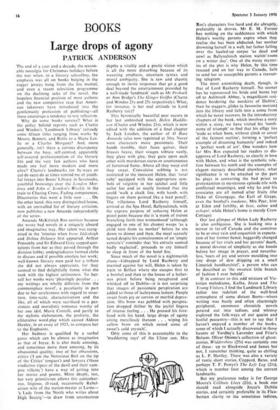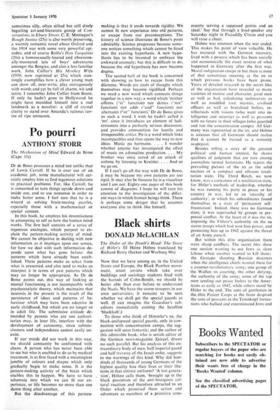BOOKS Large drops of agony
PATRICK ANDERSON
The end of a year and a decade, the season- able nostalgia for Christmas holidays before the war when, to a literary schoolboy, the emphasis was all on books bulging in the rugger jerseys hung from the fire mantel, and even a recent television programme on the declining sales of the novel, the hopeless financial position of most authors and the new competitive rasp that Ameri- can takeovers have introduced into the gentlemanly profession of publishing—all these encourage a tendency to wry reflection.
Why do some books survive? What is the policy behind reprints such as Chatto and Windus's 'Landmark Library' (already some fifteen titles ranging from works by Moore, Bennett, and Rolfe to a Shane Les- lie or a Charles Morgan)? And, more generally, isn't there a curious discrepancy between the busy, self-centred, apparently self-assured professionalism of the literary life and the very few authors who have made one feel more modern and more alive? Chatto's landmarks (or by-ways or cul-de-sacs) do at times remind me of youth- ful forays into Boots' Library in Sevenoaks, youthful browsings over the London Mer- cury and John o' London's Weekly in the train to Charing Cross. Fading competences. Discoveries that went a little sour . . . On the other hand, this very distinguished house, with an unrivalled list of literary criticism, now publishes a new Amanda independently of the series.
Amanda McKittrick Ros survives because she wrote bad novels in a uniquely absurd and imaginative way. Her talent was recog- nised in the 'nineties when Irene Iddesleigh and Delina Delaney first appeared. Arthur Ponsonby and Sir Edward Grey capped quo- tations from her as they passed through the division lobby; undergraduates formed clubs to discuss and if possible emulate her work; well-known literary men paid her a tribute she did not always appreciate, for they seemed to find delightfully funny what she took with the highest seriousness. To her- self her works were 'pleasingly peculiar ... my writings are wholly different from the commonplace novel', a peculiarity in part due to her carelessness with regard to struc- ture, time-scale, characterisation and the like, all of which were sacrificed to a pas- sionate and moralistic romance worthy of her one idol, Marie Correlli, and partly to the stylistic elaboration, the prolixity, the alliterative word-play which caused Aldous Huxley, in an essay of 1923, to compare her to the Euphuists.
Her badness is qualified by a verbal gusto which can be almost as imaginative as that of Joyce. It is also made amusing, and sometimes more than amusing, by its obsessional quality; two of her obsessions, critics ('I am the Notorious Boil on the tip of the Critics' tongues') and lawyers ('these vindictive vipers of the devil and their vam- pire villainy') have a way of getting into her stories and poems. More deeply, too, her very primitivism allows this cantanker- ous, litigious, ill-read, occasionally Rabel- aisian wife of the station-master at Larne— 'a Lady from the North who writes about High Society'—to draw from unconscious
depths a vitality and a poetic vision which is all the more disturbing because of its wavering emphasis, uncertain syntax and moral ambiguity. She is raw and chaotic enough to invite responses that go a good deal beyond the entertainment provided by a well-made 'landmark' such as Mr Prohack or Ann Bridge's The Ginger Griffin (Chatto and Windus 21s and 25s respectively). What, for instance, is her real attitude to Lord Rasberry (sic)?
This byronically beautiful peer occurs in her last unfinished novel, Helen Huddle- son (Chatto and Windus 21s), which is now edited with the addition of a final chapter by Jack Loudan, the author of 0 Rare Amanda (also now reprinted at 30s). Never were characters more passionate. Their hands tremble, their faces quiver, their breasts heave, their visages vibrate vastly, they glare with glee, they gaze upon each other with murderous stares or countenances of furrowed flame. Above all they weep and they sweat. Convulsive sobbing is not restricted to the innocent Helen, that 'rural ruby' equipped with the appropriate sym- bols of virginity in her satchel and little sailor hat and so neatly formed that she could 'walk a chalk line, with hands with fingers on them pointed like a lead pencil'. The villainous Lord Rasberry himself, arrived at the Spa Hotel, Ballynahinch, with the express purpose of seducing Helen at pistol point because she is 'a trunk of truism branching forth into womanhood' (although engaged to one of his chums) weeps 'as a child torn from its mother' before he sits down to dinner and then, the meal scarcely tasted despite his consciousness of an 'empty venticle's' reminder that 'his entrails seemed badly neglected', proceeds to cry himself to sleep in front of the hotel fire.
Since much of the novel is a nightmarish chase—kidnapped by Lord Rasberry and married against her will, Helen is taken by train to Belfast where she escapes first to a brothel and then to the house of a lecher- ous priest before being recaptured and whisked off to Dublin—it is not surprising that images of passionate perspiration are added to those of lachrymose lament. People sweat from joy or sorrow or morbid depres- sion. 'His brow was pebbled with perspira- tion dropped thither by the joyful fingers of intense feeling . . . He pressed his fore- head with his hand, large drops of agony sitting mercilessly thereon . . . wiping his sallow brow on which rested some of sweat's cold crystals'.
Only some of this is accountable to the 'maddening rays' of the Ulster sun. Mrs Ros's characters live hard and die abruptly, preferably in droves. Mr E. M. Forster has nothing on the suddenness with which Helen's worthy parents expire when they realise. she has been abducted, her mother drowning herself in a well, her father falling over the hauled-up corpse 'as dead and cowl as Ballynahinch station waitin'-room on a winter day'. One of the many myster- ies of the plot is why Helen, by this time rescued and on her way to Canada, fails to send her so susceptible parents a reassur- ing telegram.
The most astonishing death, though, is that of Lord Rasberry himself. No sooner has he repossessed his bride and borne her off to Ashbrook Abbey, 'a magnificent resi- dence bordering the outskirts of Dublin', than he staggers, glides (a favourite motion) into the library and falls into a coma from which he never recovers. In the introductory chapters of the book, which involves a story within a story, we have visited his 'tomb- stone of triumph' to find that his effigy lies 'nude as when born, without cloak or cover of the faintest outline', forming a 'perfect example of dreaming humanity' and indeed a 'perfect work of art'. One wonders how far Mrs Ros expected her readers to dis- approve of Lord Rasberry, so clearly in love with Helen, and what is the symbolic rela- tion between his tomb and the examples of elegant statuary described elsewhere, what significance is to be attached to the part he plays in converting the bad priest to protestantism (a mysterious episode rife with conflictual meanings), and why he and his associates are all named after fruits (the Duke of Greengage, the Earl of Grape,
even the brothel's madame, Mrs Pear, hint at Eden and fertility, at luxe, calme and vohipte, while Helen's home is merely Crow Cottage).
Our last glimpse of Helen Lady Rasberry is also ambiguous. She is looking into a mirror in far-off Canada and she contrives to be at once vain and coquettish in expecta- tion of her former fiance, haggardly changed because of her trials and her parents' death, a moral devotee of simplicity as she kneels before her image in prayer, and neverthe- less, 'tears of joy and sorrow moulding into tiny drops of dew dripping on a small Limerick handkerchief', a person who can be described as 'the sweetest little branch of fashion I ever beheld'.
If in contrast to this odd mixture of Vic- torian melodrama, Kafka, Joyce and The Young Visiters, I find the Landmark Library
rather too redolent of the well-bred atmosphere of some distant Boots—where
writing was busily and often charmingly peripheral, enormous chronicle novels petered out into tedium, and whimsy explored the folk-ways of our quaint and lustful peasantry—this is not to say that I haven't enjoyed a number of the books, some of which I actually discovered in those haunts of Yardley's Lavender and Friar's Balsam. Oliver Onions's collection of ghost- stories, Widdershins (25s) was certainly one of these: up to Blackwood and James but not, I remember thinking, quite as chilling as L. P. Hartley. There was also a variety of rustic short stories, Coppard, Bates, and perhaps T. F. Powys's The Left Leg (21s), which is number four among the current landmarks.
But my preference today is for George Moore's Celibate Lives (21s), a book one should read alongside Joyce's Dublin stories, and certainly preferable in its Flau- bertian clarity to the sometimes tedious, sometimes silly, often stilted but still dimly beguiling art-and-literature gossip of Con- versations in Ebury Street. C. E. Montague's Rough Justice (25s) is also worth preserving, a warmly romantic novel about Oxford and the 1914 war with some very powerful epi- sodes; and of course Rolfe's Don Tarquinio (21s) a homosexually-heated and obsession- ally-mannered tale of boys' adventures amongst the Borgias; and also a less familiar work, John Collier's His Monkey Wife (1930, now reprinted at 25s) which stun- ningly exemplifies how a clever young man can show off, over-write, play outrageously with words and yet be full of charm, wit and satire. I remember John Collier from Boots. If only he hadn't gone to Hollywood he might have moulded himself into a real landmark as a novelist: a cliff of crystal clarity to stand over Amanda's ruinous rav- ine of ripe unreason.















































 Previous page
Previous page